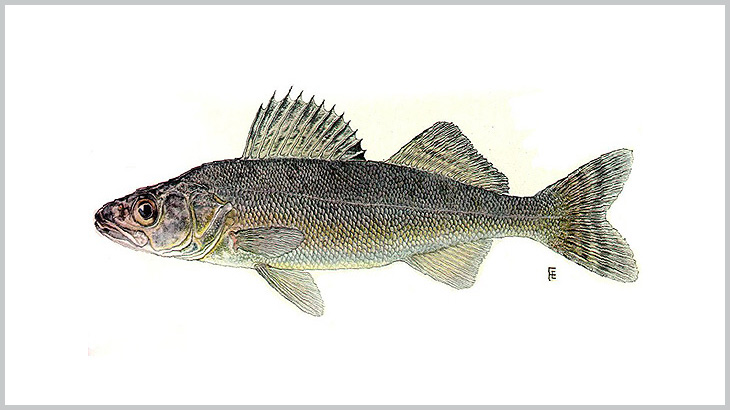
Blue Pike
Name: Blue Pike (Sander vitreus glaucus)
Conservation Status: Extinct
The blue pike was an endemic fish of the Great Lakes region in the United States and Canada. Once commonly found in the waters of Lake Erie, Lake Ontario, and the Niagara River the blue pike preferred cool, clear and deep water in summer, and switching to nearshore waters as they cooled and became less murky in the winter.
The blue pike was pursued intensely by commercial and sport fishers, who together landed a billion pounds of the fish between 1885 and 1962. At times, the blue pike made up more than 50 percent of the commercial catch in Lake Erie.
At the same time the fishing industry was growing in the Great Lakes, the number of Euroamerican settlers in the region was increasing as well. With the increasing human population came increased habitat degradation. The settlers drained marshes and wetlands, built dams in tributary rivers, and caused large increases in the amount of pollution and sediment that entered the lakes.
All of these actions contributed to the deterioration of the cool, clear habitat needed by the blue pike. During the 1900s, several non-native species of fish were introduced to the Great Lakes, including the sea lamprey, alewife, and rainbow smelt. These contributed to the decline of the blue pike through predation and competition.
The population crashed in 1958, but the blue pike lingered on until it became extinct in 1970.
In the same general time period, three other species of fish endemic to the Great Lakes also disappeared. These were the deepwater cisco (C. johannae) in the 1950’s, native to Lake Huron and Lake Michigan; the blackfin cisco (Coregonus nigripinnis) in the 1960s, native to all of the Lakes except Erie; and the longjaw cisco (C. alpenae) in the 1970’s, native to Lakes Erie, Huron and Michigan.
Each of these species succumbed to the cumulative effects of overexploitation by fishers, pollution, siltation and other forms of habitat degradation due to development, and predation and competition from non-native species.
Questions for Thought:
Cumulative effects can be difficult to predict and measure. Should commercial fishers have to reduce their fishing level because of pollution caused by another industry?
A lot of fishing in the Great Lakes and other regions is conducted from charter boats, boats that are hired for a day or a weekend to take fishers out to the good fishing spots. Boat owners and skippers depend on this business for their living. Should this kind of fishing be considered sport fishing or commercial fishing? Why might it make a difference in some cases?
Related Classroom Activities:
[CS2-8,C3-1,C3-2, General]